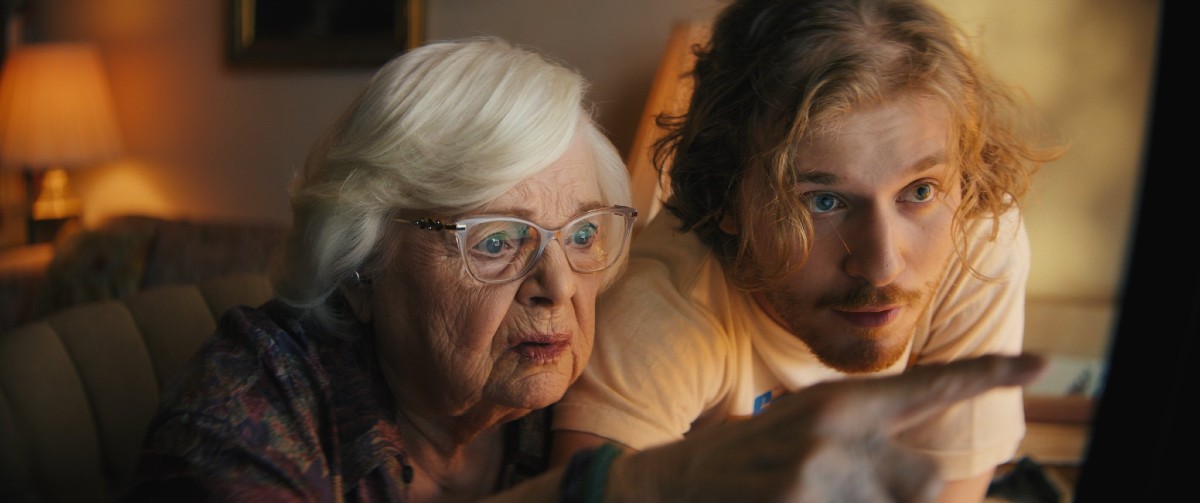
I knew I was in good hands with Josh Margolin’s Thelma the minute I saw the title card, which was written in ornamental needlepoint. June Squibb, giving the performance of a lifetime (literally), plays 93-year-old Thelma, who has been living on her own ever since she lost her beloved husband two years ago. Her sweet but chronically insecure grandson, Daniel (White Lotus’ Fred Hechinger), looks after her, dotingly. She adores him, always making sure he leaves with something—like a comically giant canister of pretzel bites she can no longer chew—and constantly telling him how perfect he is. And he loves her right back, happily guiding her around the computer (“that’s not how you scroll”) and insisting she wear her Life Line bracelet when he’s not with her, “for my mental health.”
But as soon as Daniel leaves, Thelma always takes off the bracelet. It’s uncomfortable, and she likes her independence, even though her license was taken away a few years ago. She misses driving, she says longingly at one point.
When Thelma gets a phone call from “Daniel,” who says he’s in prison after getting in a car crash and tells her to wait for instructions from his lawyer, we gasp, immediately knowing what’s up.
“You sound funny,” Thelma says to fake Daniel.
“I broke my nose,” he says. (Not so fun fact: Scammers are already using AI to create realistic voice simulacrums of our loved ones, so we’re all screwed.)
Next she speaks to the “lawyer” who says she needs to get $10,000 in cash to a P.O. Box right away.
She finds the money, tucked away in book shelves and under the bed, and puts it in an envelope. As she slowly slides the money into a mailbox, we watch, in horror: Nooooooo.
But it’s too late. The money has been sent.
Thelma calls her daughter, Gail (Parker Posey), who gets a bit frantic herself. She tries Daniel’s number, but he doesn’t pick up. Then she tells her husband, Alan (Clark Gregg), who calls their son again. This time, he picks up, groggily. He was just sleeping.
They go to the police, but it’s fairly useless, because it was sent via regular post.
When the police officer explains that scam artists find private information—Daniel’s name, for example—on social media, Thelma moans, “How can Zuckemborg let this happen?”
To the family, it’s an unfortunate incident, but one they can easily put behind them. But Thelma is outraged. She wants her money back.
She’s doubly frustrated when she hears her family discussing her in an adjacent room—maybe it’s time to put Grandma in a home, they’re saying.
“I just lost my wallet,” Daniel says, defending her. “Are you going to put me in a home?” (From there, the conversation immediately pivots to whether or not Daniel has arranged to get a new driver’s license, because it’s extremely dangerous to drive without one, and he needs to get on that right away. I am related to these people.)
Fueled by a sense of injustice—and a newfound appreciation for Tom Cruise in Mission Impossible—Thelma sets out to find the scammers and reclaim her money.
There’s only one problem: She knows the family won’t support her mission and she can’t drive. So she goes to the retirement home where her friend Ben (Richard Roundtree, wonderful) lives and, after a bit of small talk, steals his motorized scooter. He steals another scooter and chases her around the center. She and Ben come to an impasse—but not before a head-to-head collision—and he reluctantly agrees to tag along on her mission.
One of the many ingenious things about Thelma is it’s treated like a (low-stakes) Mission Impossible film, with snappy, caper music accompanying Thelma’s every move. This starts with the chase scene at the senior center—that scooter corners like it’s on rails, by the way—and continues when Thelma outsmarts her family, who are now frantically searching for her, by tossing her Life Line bracelet over a fence. (An aside: Fans of The Daytrippers will delight in seeing Parker Posey driving in the back seat of another family vehicle on a quest.) But the film’s greatest set piece comes when Thelma finds herself in an extremely cluttered antique store hoping to confront the bad guys. Ben is waiting outside, wearing an ear piece (actually, his iPhone, set to hearing aid mode), and he guides her, as though she’s Tom Cruise navigating lasers next to a priceless safe. When she lands with a thud on a bed in the store and rolls off it like a cat burglar, I lost it.
On top of the delightful performances by its entire cast and those winking action sequences, Thelma is genuinely one of the funniest films I’ve seen in a while.
At one point, Daniel makes his way through the retirement home, looking for Thelma.
“Grandma?” he yells out—and several hopeful voices reply, “Yes?”
There’s a running gag where Thelma bumps into people who look familiar, and they cheerfully try to figure out their connection. Mutual friends? No. The same synagogue. No. The sly joke is that when you hit 93, everyone looks familiar.
Another good joke also captures the poignancy of this film. The workers at the retirement home ask Thelma’s family if she has any ailments.
Well, she had valve replacement, hip replacement, a double mastectomy, and has a slow-growing brain tumor, they say. Besides that, she’s fine.
Getting old is not for the faint of heart, the film reminds us. But if you approach life as the great adventure it is, you’ll leave with no regrets.
